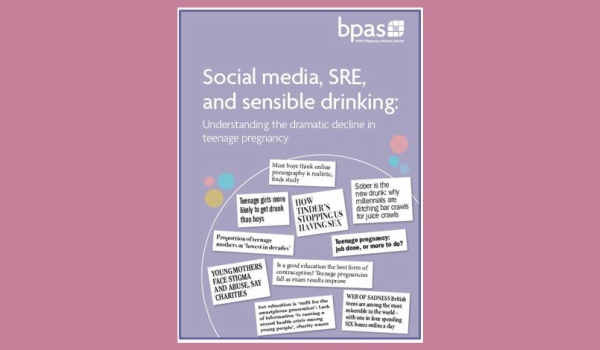
A new report, Social media, SRE and Sensible Drinking: Understanding the dramatic decline in teenage pregnancy, by Bpas, published in July 2018, examined key trends in teenage lifestyles and outlook, as well as young people’s experience of sex and relationships education (SRE) and use of contraception. It is based on qualitative and quantitative research conducted by YouGov and Bpas with four online focus groups and a demographically weighted survey of 1,004 16-18 year olds.
The report’s chapters cover: teenage pregnancy rates in the UK, aspirations, priorities, and wellbeing of 16-18s, perception of teenage pregnancy and young parenting, social interaction and online lives, contraception, sexual behaviours, sex and relationships education, and use of alcohol and drugs.
Key findings
- This generation appears family-oriented and are more likely to place high value on time with their family than their friends, which may impact upon opportunities for sexual relationships.
- Social, romantic and sexual relationships are increasingly experienced online, and sexting is seen as an alternative as well as a precursor to intercourse.
- Only one third of the 16-18 year olds surveyed (34%) said they had had sex, and over-estimate the proportion in their peer group who have. Those who evaluate their sex and relationships (SRE) education as good appear likely to delay sexual activity, which gives added impetus to the government’s plans to introduce mandatory SRE from September 2019.
- Thanks to the legacy of the Teenage Pregnancy Strategy, they have greater access to more reliable contraceptive options, including methods like the implant and IUD, although contraceptive use can be inconsistent.
- While often negative about the political and economic environment, teenagers feel confident that with hard work and commitment at school they personally will enjoy a good quality of life and that pregnancy at a young age will thwart that.
- Getting good grades or succeeding in their chosen career was the top priority for the young people surveyed, with 82% of respondents stating this was of high importance, compared to 68% who felt that spending time with their friends was of high importance.
- They drink significantly less alcohol and see excessive alcohol consumption as a dangerous activity that puts them at risk of unwanted incidents. Teenagers who consumed alcohol at lower levels were less likely to have engaged in sexual activity, suggesting changing drinking behaviours may have contributed to the decline in conceptions.
- Teenage pregnancy is highly stigmatised by young people themselves and there are low expectations of support. Only a quarter of all young people surveyed (25%) expected a high level of support from the state if they became pregnant.



